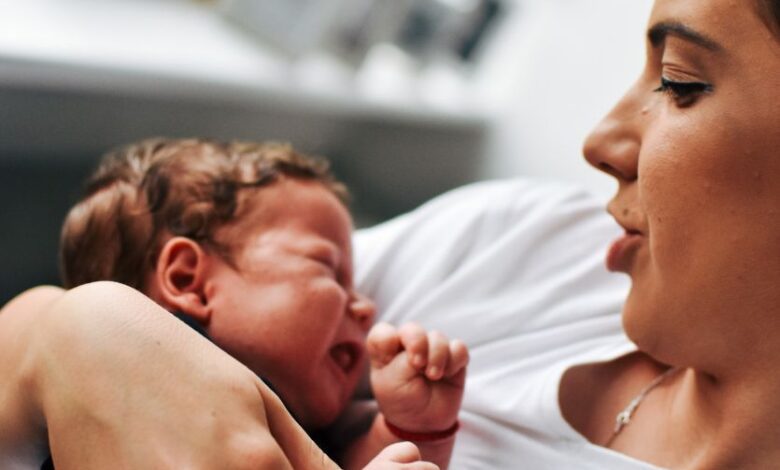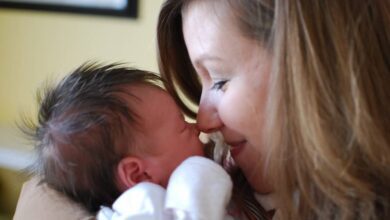Transitioning to Motherhood Has a Name

When I first became a mother, I also became an amateur statistician and scientist. I recorded percentiles and observed milestones. I have apps for tracking daily activities and this new thing called a leap magically explains every terrible night of sleep. It was somehow not lost on me that my son was going through an intense and profound developmental phase.
My role, as their mother, is to nurture this development and support my child in reaching their potential. As my son moves from infant to toddler, toddler, preschooler and on into adulthood – I have come to accept that this stage of development is essentially an ongoing process that requires evolving support.
Let’s compare that to motherhood.
You give it to your baby and BAM – instant change. Some mysterious combination of instincts and hormones suddenly gives you all the knowledge and skills needed to be a mother. That’s it. There is only ‘before you became a mother’ and ‘mother’.
It doesn’t matter if you’ve never changed a diaper, know nothing about breastfeeding or never held a baby – at least in that moment, when you look into your child’s eyes and fall deeply in love, you just know.
And we all know it’s a lie. A very dangerous one.
Early motherhood is best described as a steep learning curve and a wicked rollercoaster. If you can get an honest answer, I think most mothers are more likely to use the word ‘disorienting’ than ‘joyous’ when describing the transition to motherhood.
If we begin to turn to our feelings, beneath the depths of our weariness, we may find love bordering on infatuation mixed with a strange sense of sadness. That’s not in the baby books.
Our village basically consists of online message boards to engage in long threads on the many merits and pitfalls of 3-day potty training. Somehow too much advice is not encouraging. We ping-pong from good mom to bad mom every day, moment by moment with every perceived success and failure.
What if women were told that the transition to motherhood would take years – and, in fact, was an ongoing process as life unfolded in its inevitable changes?
I think most will be relieved that that description is more in line with our experience, offering some reassurance that there is nothing wrong with us.
There is one word for what I am describing: Matrescence
The definition comes from Aurélie Athan, Ph.D., a clinical psychologist at Columbia University:
“The process of becoming a mother, created by Dana Raphael, Ph.D. (1973), is a developmental passage through which a woman moves through pre-conception, pregnancy and birth, surrogacy or adoption, to the postnatal period and beyond. The exact length of matrescence is individual, repeats with each child, and can last a lifetime! The range of changes spans many domains –bio-psycho-social-political-spiritual– and can be likened to promoting youth development.” – Aurélie Athan, Ph.D.
Why is matrescense important?
Words are powerful – putting a name to this experience gives us the language we need to talk about it.
Recognizing the transition to motherhood as a developmental process means we can take steps to support it – both as individuals and as a culture. Approaching motherhood with support and compassion results in a better experience.
Matrescence is important because instead of saying, “I’m struggling like this – I must be a bad mother.”
we can say, “I find this phase of motherhood a struggle – I wonder what support I need?”
Instead of being stuck in this good mom / bad mom binary, we can give ourselves permission to stop and reflect.
If you’ve ever wondered…
- When does it get easier?
- When will I feel like myself?
- Why isn’t it more natural?
Matrescence gives us a safe space to explore these challenging questions.
It allows us to make sense of our journey, activate our inner knowing and step confidently into motherhood.
As the years went by, I read less and less articles. No more parenting apps on my phone. When faced with the latest milestone, I’m rarely tempted to crowdsource advice.
Part of it is the passage of time – some things get easier. But it is more than that. When I started devoting time and space to my own motherhood development, something changed. I stopped obsessing over ‘getting it right’ and started finding fulfillment in the journey itself.
Anxiety was replaced by a mixture of curiosity, excitement and overwhelming sympathy as I grew up with my children.
Matrescence isn’t just important – it might just be the missing piece that brings it all together.
Our next reco: New Mom Guilt: Why You Are Not a Failed Mother





